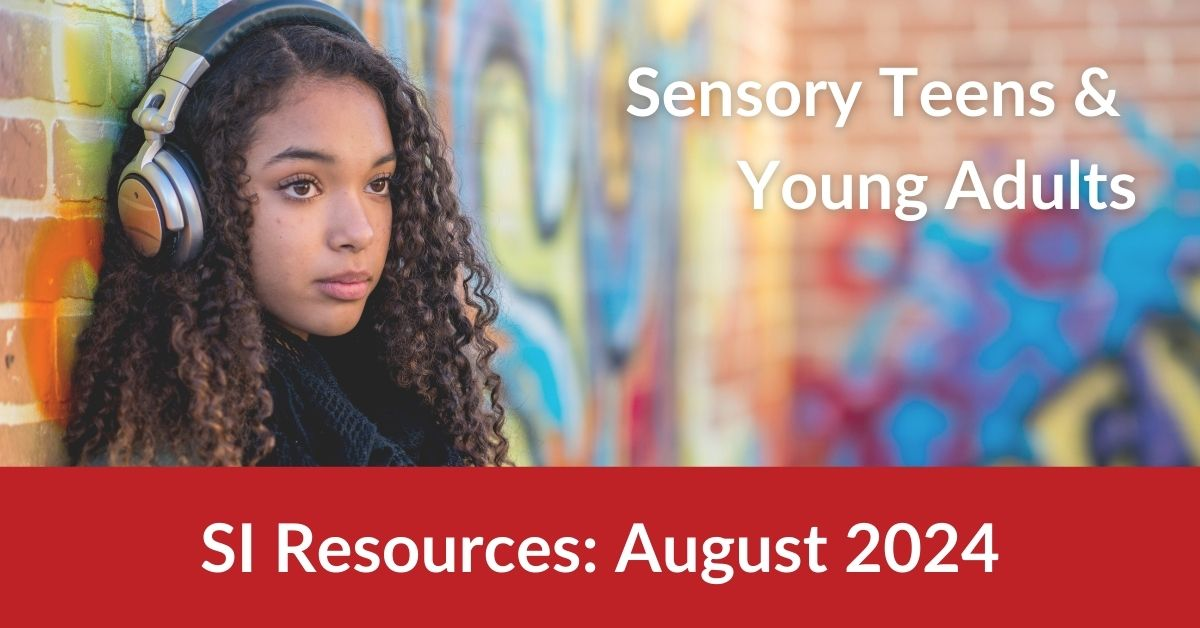SI Resources August 2024: Sensory Teens and Young Adults
By Sensory Integration Education, 30 July 2024

This month's SI Resources blog is focused on sensory teens and young adults.
Navigating the teenage years and young adulthood can be challenging and if a young person is dealing with sensory differences in everyday life too, it can feel even more overwhelming. Coping with these challenges requires teens and young adults – and the people around them – to understand their unique sensory needs and find helpful strategies and adaptations in their day-to-day life.
In this month’s blog, we’ve curated articles, guides, books and products to help better inform ourselves of how we can support these individuals.

7 Ways to Support and Empower Sensory Teens - Adolescence can be a time of excitement and growth. But for teens with sensory processing differences, it can come with its own set of obstacles, making it difficult at times for them to process and respond to sensory information in the same way neurotypical teenagers do. In this SIE blog, we look at 7 ways to support and empower these remarkable sensory teens.
Sensory Processing and the Teenage Years - Teenagers are going through new changes and we need to learn how best to support their sensory needs during this time of life This article from Growing Hands-On Kids looks at a number of sensory strategies and sensory activity ideas which as a parent, teacher or therapist can help you foster where they are developmentally and help them through these new situations.
One-to-One Online Coaching with a Sensory Integration Trained Occupational Therapist – if you know a parent or carer who has a child with sensory processing differences, they may be interested in booking a one-to-one online coaching session with one of SIE’s Occupational Therapists trained in Sensory Integration. Whilst this is not an assessment or therapy session, they’ll receive tailored information and advice specific to their child’s or teen’s sensory processing challenges along with practical strategies and actionable insights to support the individual’s development and daily life.
How to Sharpen Executive Functions: Activities to Hone Brain Skills - Executive functioning skills range from working memory to cognitive flexibility to inhibitory control, and beyond. They power our daily functioning, future planning, and mental/physical health. This article from ADDitude contains useful activity suggestions for developing and improving executive function skills in young people.
Resources for Autistic Teenagers – the Know Yourself series from the National Autistic Society offers a comprehensive set of free resources (videos, PDFs, worksheets, etc.) to support autistic teens in understanding what being autistic means to them
What Young Neurodivergent Employees Need to Know about Starting Work and How to Get the Right Support - More people than ever are being diagnosed as neurodivergent. In the UK, conditions including ADHD and autism are estimated to affect 15-20% of the population. This is particularly true for younger people. Surveys show that one in five workers between the ages of 16-24, and as many as one in two, aged 25-34, identify as neurodivergent. According to the UK National Autistic Society, 45% of neurodivergent people have lost or left their job because of challenges due to being misunderstood. This article from The Conversation sets out a number of ways to help a young neurodivergent employee navigate the workplace.
BBC Scotland - The Social - Meet the Young Adults Embracing Neurodiversity - BBC The Social is a digital team based in Glasgow that develops new creative talent from all across Scotland. Here they introduce us to a number of young adults embracing neurodiversity – from Josie who has dyscalculia to Taryam Boyd who was diagnosed with ADHD at 22 and Sarinah O’Donoghue who was diagnosed with autism at 20.
Books and Product Ideas







